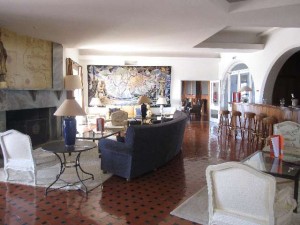I have checked into the pousada my mother and father stayed in. I’ve had my dinner there late in the evening with all of the couples and a solitary professor of social work from Munich. He smiles and introduces himself. He drinks deeply from his bottle of wine. He cannot eat and talk at the same time. He tells me this, “I eat, and, then, we talk.” He is fastidious in his table manners as if the use of knives and forks transcend the elegantly presented food put before him.
I am happy the professor of social work from Munich cannot eat and talk at the same time. I crave silence to conjure up a different time …my father and my mother eating their dinner in the pousada. My mother is dressed in her long, black skirt that she bought to go live in Vienna. She has on a sleeveless white, knit top with a black, hand knit sweater over her shoulders. She has on her grandmother’s gold bracelet, her wedding rings and the lovely, Spanish costume jewelry pin with variously colored chunks of luminescent glass. She wears black sandals and her toe nails are painted red. Her silver hair is combed away from her face and she has put on red lipstick and smells of just a hint of Annick Goutal “Gardenia Passion.” She carries her sleek little understated red clutch …the one with the fold-over top that is gathered into a button covered with the same soft, ridged material.
It is still the no place time of winter into spring. There are just a few couples in the dining room …there is just the social work professor from Munich and I. We are all the dining dead. No one is talking. There is the bell sound of heavy cutlery on fine china. There is the hurried pad of feet of the silent staff walking to and fro on the softly woven carpets. There is soft music in the background, but no one is talking …
…but, my mother and father are talking. My mother and father are not the dining dead. They talk because my mother draws my father into conversation. My mother asks my father if he can see the lighthouse across the bay …the one with the red, blinking light in front of the fortaleza. She asks my father, if perhaps, he would like to go over there and, if they should, perhaps, visit a market to buy things to pack a lunch. My father maps out the following day to her. They will go to the market to buy little Portuguese sausages and cheese, bread and olives, apples and little, sweet pasteles de nata for desert. They will then go to the fortaleza and the lighthouse. My mother’s conversation is all perhaps …perhaps …as if she has no desires of her own. To have desires of her own would insure that my father would, perhaps become angry and choose a different course for the day …so she is very careful how she draws my father out. Underneath, my mother is itching to go to the fortaleza and the lighthouse. She longs to search for trailing pots of nasturtiums on the sidewalks of the town. My mother is burning to make journeys of her own. My father will take picture after picture. My father’s picture-taking will be my mother’s magnificent release. It will give her time to have thoughts all her own that give her relief from this life she has with my father …thoughts she will write in the book that is in the room of the things I have kept …fragile thoughts carefully hidden having nothing to do with the vainglorious stories of my father.
I have dessert and coffee with the social work professor from Munich. We will have a nice conversation …but by now, I really don’t wish to converse. I will excuse myself from the table only when a polite length of time will have passed. I will tell him it has been nice to talk with him and that perhaps I will see him again, but my mind will be taking the carpeted steps to my room. I will come to the bar later. I will sit in a dark corner by the fire drinking a glass of white port looking out onto the nighttime sea and the lighthouse that blinks its red light on and off. The social work professor from Munich will be drinking his bottle of wine. He won’t be able to see me.
Perhaps he will be thinking his thoughts.
Perhaps I will be thinking mine.
